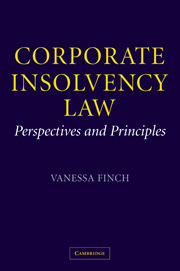Book contents
- Frontmatter
- Contents
- Acknowledgements
- Table of cases
- Table of statutes and other instruments
- List of abbreviations
- Introduction
- Part I Agendas and objectives
- Part II The context of corporate insolvency law: financial and institutional
- 3 Insolvency and corporate borrowing
- 4 Corporate failure
- 5 Insolvency practitioners
- Part III The quest for turnaround
- Part IV Gathering and distributing the assets
- Part V The impact of corporate insolvency
- Conclusion
- Bibliography
- Index
5 - Insolvency practitioners
Published online by Cambridge University Press: 05 June 2012
- Frontmatter
- Contents
- Acknowledgements
- Table of cases
- Table of statutes and other instruments
- List of abbreviations
- Introduction
- Part I Agendas and objectives
- Part II The context of corporate insolvency law: financial and institutional
- 3 Insolvency and corporate borrowing
- 4 Corporate failure
- 5 Insolvency practitioners
- Part III The quest for turnaround
- Part IV Gathering and distributing the assets
- Part V The impact of corporate insolvency
- Conclusion
- Bibliography
- Index
Summary
Corporate insolvency processes are not mere bodies of rules: they are elaborate procedures in which legal and administrative, formal and informal rules, policies and practices are put into effect by different actors. Those actors, in turn, have cultural, institutional, disciplinary and professional backgrounds which influence their work. They also operate under the influence of a variety of economic, career and other incentives and are subject to a host of constraints ranging from legal duties and professional obligations to client and own-firm expectations. The Cork Report, in an oft-quoted statement, urged that the success of any insolvency system is very largely dependent upon those who administer it, and socio-legal scholars have emphasised how insolvency law is not applied in a mechanical way but is manoeuvred around or manipulated by means of administrative structures ‘designed and imposed by dominant actors’.
This chapter looks at how insolvency law is made operational by those actors who dominate insolvency processes: the insolvency practitioners (IPs). In accordance with the discussion in chapter 2, it will be asked whether present practitioner structures and modes of operation can be supported as productive of insolvency regimes that are efficient, expert, fair and accountable. This will demand examinations of both the way that IPs carry out their tasks and the way that IPs are regulated.
The chapter commences by outlining the development of the current administrative structure of insolvency law; it then examines IP structures and performance with reference to the above criteria; and finally it considers alternative ways of administering insolvency regimes.
- Type
- Chapter
- Information
- Corporate Insolvency LawPerspectives and Principles, pp. 145 - 184Publisher: Cambridge University PressPrint publication year: 2002
- 2
- Cited by



